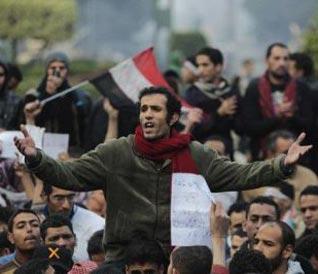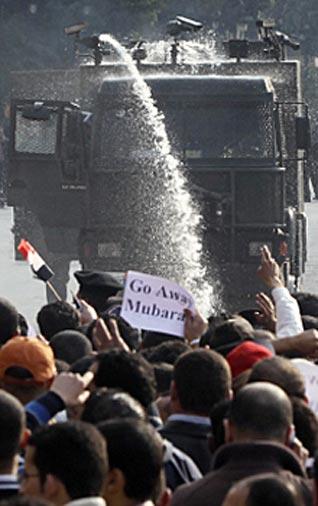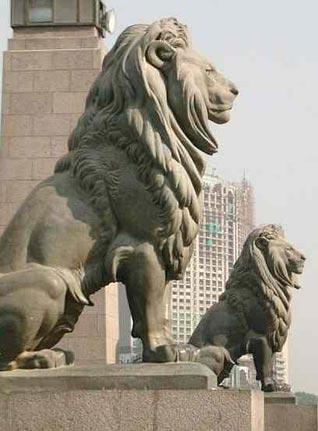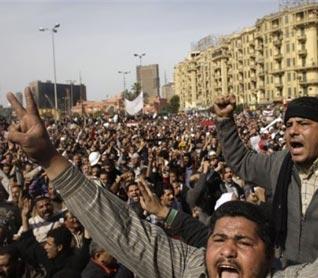Roundtable
Egypt - River of Freedom
The Roundtable Open Forum # 60
by THOMAS L. FRIEDMAN
The Roundtable Open Forum # 60
Cairo, Egypt
I'm in Tahrir Square, and of all the amazing things one sees here the one that strikes me most is a bearded man who is galloping up and down, literally screaming himself hoarse, saying: "I feel free! I feel free!"
Gathered around him are Egyptians of all ages, including a woman so veiled that she has only a slit for her eyes, and they're all holding up cellphones taking pictures and video of this man, determined to capture the moment in case it never comes again.
Aren't we all?
In 40 years of writing about the Middle East, I have never seen anything like what is happening in Tahrir Square. In a region where the truth and truth-tellers have so long been smothered under the crushing weight of oil, autocracy and religious obscurantism, suddenly the Arab world has a truly free space - a space that Egyptians themselves, not a foreign army, have liberated - and the truth is now gushing out of here like a torrent from a broken hydrant.
What one hears while strolling around are all the pent-up hopes, aspirations and frustrations of Egyptians for the last 50 years. I know the "realist" experts believe this will all be shut down soon. Maybe it will.
But for one brief shining moment, forget the experts and just listen. You have not heard this before. It is the sound of a people so long kept voiceless, finally finding, testing and celebrating their own voices.
"We got a message from Tunis," Hosam Khalaf, a 50-year-old engineer stopped me to say. "And the message was: Don't burn yourself up; burn up the fear that is inside you. That is what happened here. This was a society in fear, and the fear has been burned." Khalaf added that he came here with his wife and daughter for one reason: "When we meet God, we will at least be able to say: ‘We tried to do something.' "
This is not a religious event here, and the Muslim Brotherhood is not running the show. This is an Egyptian event. That is its strength and its weakness - no one is in charge and everyone in the society is here. You see secular girls in fashionable dress sitting with veiled women. You see parents pushing their babies wearing "Mubarak must leave" signs. You see students in jeans and peasants in robes. What unites all of them is a fierce desire to gain control of their future.
"This is the first time in my life I get to say what I think in public," said Remon Shenoda, a software engineer. "And what is common here is that everyone wants to say something."
Indeed, there is a powerful sense of theft here, that this regime and its cronies not only stole wealth, but they stole something so much more precious: the future of an entire generation of Egyptians, whom they refused to empower or offer any inspiring vision worthy of this great civilization.
"All Egyptian people believe that their country is a great country with very deep roots in history, but the Mubarak regime broke our dignity in the Arab world and in the whole world," said Mohamed Serag, a professor at Cairo University.
By the way, everyone here wants to give you their name and make sure you spell it right. Yes, the fear is gone.
Referring to Egypt's backward public education system that depends so much on repetition, one young girl was wearing a sign urging Mubarak to leave quickly. It said: "Make it short. This is history, and we will have to memorize it at school."
Grievances abound. An elderly woman in a veil is shouting that she has three daughters who graduated from the college of commerce and none of them can find jobs. There are signs everywhere asking about Mubarak, a former Air Force chief. Questions such as: "Hey Mr. Pilot, where did you get that $17 billion?"
You almost never hear the word "Israel," and the pictures of "martyrs" plastered around the square are something rarely seen in the Arab world - Egyptians who died fighting for their own freedom not against Israel.
When you enter the square now, one row of volunteers checks your ID, another frisks you for weapons and then you walk through a long gauntlet of men clapping and singing an Egyptian welcome song.
I confess, as I walked through, my head had a wrestling match going on inside. My brain was telling me: "Sober up - remember, this is not a neighborhood with happy endings. Only bad guys win here." And my eyes were telling me: "Just watch and take notes. This is something totally new."
And the this is a titanic struggle and negotiation between the tired but still powerful, top-down 1952 Egyptian Army-led revolution and a vibrant, new, but chaotic, 2011, people-led revolution from the bottom-up - which has no guns but enormous legitimacy. I hope the Tahrir Square protesters can get organized enough to negotiate a new constitution with the army. There will be setbacks.
But whatever happens, they have changed Egypt.
After we walked from Tahrir Square across the Nile bridge, Professor Mamoun Fandy remarked to me that there is an old Egyptian poem that says: " ‘The Nile can bend and turn, but what is impossible is that it would ever dry up.'
"The same is true of the river of freedom that is loose here now. Maybe you can bend it for a while, or turn it, but it is not going to dry up."
ROUNDTABLE OPEN FORUM
We invite readers to share your thoughts on the aforesaid, as part of the Roundtable this week.
How do the events in Egypt touch you, effect you ...?
[Courtesy: The New York Times]
February 10, 2011
Conversation about this article
1: H.S. Vachoa (U.S.A.), February 10, 2011, 5:47 PM.
Freedom is the most essential ingredient in humanity.
2: Ajay Singh (Rockville, Maryland, U.S.A.), February 10, 2011, 6:09 PM.
It is an amazing event. It has certainly made fools of pundits who could never imagine the bedouin as a messenger of peace and freedom. I am thrilled that this bias can be forever laid to rest and hopefully this event will bring Egypt and the rest of the Arab world some control over their future and much needed political reform. Gandhi would be envious of this truly "non-violent" event. If only he could have had this much success for this long. It would be a shame if the world let Mubarak bait this peaceful movement into violence and bloodshed; it certainly appears he is trying for that outcome. Now is not the time for the U.S.A., U.K., Germany or U.N. to be on the sidelines but engage and ensure a peaceful transition.
3: G.C. Singh (U.S.A.), February 11, 2011, 12:31 PM.
As I am writing, President Hosni Mubarak has just handed over his powers to the army which has assured protesters that they are committed to conducting free and fair elections. Here are some of the most important reasons why the Egyptian revolution seems to be moving towards success. Of course, the people's determination and sacrifice are the first and foremost causes but it is the army's role which has been most crucial. Imagine if they had opened fire or went after the protesters and brutally suppressed this whole thing. In that case I doubt the results would have been the same, as we are seeing today. Egyptians were lucky that the whole world's attention was focused on them because of non-stop media coverage direct from Tahrir Square. You have to watch Al Jazeera to realize the role it has played in the success of this revolution. As I have written here before, in stark contrast, the Indian army was used against the Sikhs in Mohandas Gandhi's own so-called "non-violent" country. Indira Gandhi literally imposed Marshall law in Punjab and complete curfew was imposed with over half a million armed forces placed in Punjab alone. Amritsar and Harmandar Sahib were surrounded by about 70,000 Indian army personnel who had been fully brainwashed against Sikhs. Complete media blockage was placed and journalists were physically removed from Amritsar. The brutality of the attack, where all forms of modern warfare including tanks, armored vehicles, helicopters and chemical weapons were used on the 20-acre religious complex and against a small band of Sikh defenders and thousands of unarmed Sikh pilgrims, is unmatched in the annals of history. Sikhs must realize that the Indian army is not their friend and only effective levers of political economic and military power in our own hands will ensure our dignity and security.
4: Sangat Singh (Kuala Lumpur, Malaysia), February 11, 2011, 5:40 PM.
It will now be "out of the frying pan and into the fire".
5: N.Singh (Canada), February 11, 2011, 9:26 PM.
G.C. Singh ji: I agree with you wholeheartedly. However, one of the main reasons that the Sikh Freedom Movement failed and the Egyptian one has succeeded is that the will for the fight and the desire to live as free men was not there for the general Sikh population. Shaheed Jarnail Singh Bhindranwale was not supported by the Sikh intelligentia, which has never succeeded in producing its own charismatic leaders. They were willing to sell themselves out to the Indian government and that included the likes of Khushwant Singh, General K.S. Brar and K.P.S. Gill. We can only blame the Indian government and the Indian Army to an extent. Even now there are some Sikhs who feel that they are better living on their knees as Indians than trying to stand on their own two feet as free men.
6: Ajay Singh (Rockville, Maryland, U.S.A.), February 12, 2011, 4:29 PM.
If I may in two lines express one point in reference to S.N Singh's post and that is whether it is the failure of Sikh the intelligentia or of the peasantry, it is still a SIKH failure. I think we Sikhs fail to appreciate that negotiations are also an equal part of a struggle - just as vicious and bloody. Do we have "warriors", if you will, for that battle? To date, no. We have always failed at the table, not necessarily on the field. But it is a collective failure.
7: Brijinder Singh (New York, U.S.A.), February 16, 2011, 8:48 AM.
I think the Khalistan movement failed because it never gained popularity in the cities. That is where revolutions are won because they have the force of a large population behind them. Much of Punjab is agricultural land. These people are busy trying to feed their families, and have no time to organize a political movement. If a revolution is to happen today, it will happen with the youth in the universities. Too bad they are all busy doing drugs.






